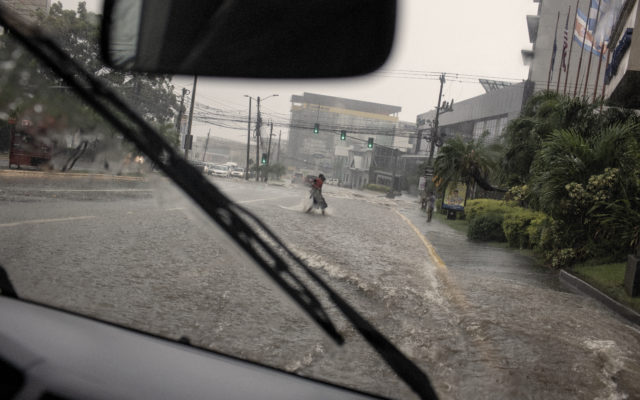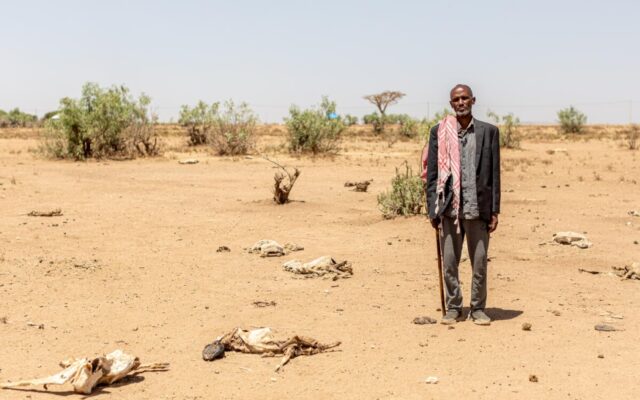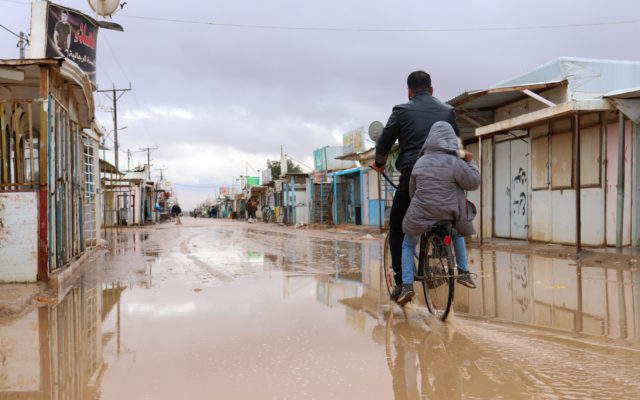Our world is facing two major crises: the displacement crisis and the climate crisis. I witnessed both on my recent visit to Kenya.
UK for UNHCR CEO Emma Cherniavsky shares her reflections following her recent trip to Kenya
30.11.23
In Kakuma Refugee Camp with Isaac, a shop owner who arrived in Kakuma as a 16-year old orphan from Rwanda. He now employs 7 refugees in his shops.
As the world convenes at COP28 to address the global urgency of the climate crisis, we must reflect on the profound impact of climate change, especially on the world’s most vulnerable people.
The climate crisis affects all of us, but not equally. Last year alone, UNHCR witnessed over 32 million new displacements due to disasters and climate-related events. This is the highest figure in a decade.
Refugees, displaced people and their hosts are living on the frontlines of a changing world. The crisis is driving displacement and making life more precarious for those who have already been displaced. Refugees who have fled war, violence and persecution are now enduring drought, flooding and extreme temperatures.
Almost 60% of the world’s refugees and people displaced by conflict are living in the most climate-vulnerable countries. Refugees in the East and Horn of Africa in particular, are on the frontlines of these extremes – facing flooding, drought and devastation, as well as conflict and persecution.
Those least responsible for global warming are being hit the hardest. Displaced families across Kenya, Ethiopia, Somalia are among those who suffer the most. In the region, the effects of a catastrophic drought – the worst in four decades—are threatening the survival of millions of people. Water sources remain dried up, crop failures have reduced agricultural productivity and livestock have perished, stripping people of their livelihoods and the ability to support themselves and their families.
Scarce drinking water and agricultural difficulties make daily life even more challenging
During my recent visit to Kakuma, Kenya I witnessed firsthand the harsh reality of climate change and its impact on refugees and the host community.
Kakuma camp is in the Turkana district, traditionally an area of pastoral living reliant on livestock. The camp was founded 30 years ago and was initially intended as a temporary measure. There are now 282,000 refugees living in Kakuma, the vast majority of whom are women and children, coexisting with a local community of 250,000 Kenyans.
Thousands of refugee families arrive each year in Kenya, seeking safety in areas that have also been impacted by drought, and where assistance is limited by lack of funding. They are from a number of African countries including South Sudan, Somalia, the Democratic Republic of the Congo (DRC), Burundi, Uganda, and Rwanda.
Kakuma faces increasing challenges in managing relationships between refugees and the host community. Scarce drinking water and food insecurity is magnified, making daily life even more challenging for refugees and their families.
Addressing this challenge must be a collective focus
Sadly, Kakuma camp is facing significant funding shortfalls. Last year, UNHCR received less than half of the required financial resources to respond to the drought in the Horn of Africa. Many other UN agencies and international NGO’s have been impacted, which also has a knock-on effect on their ability to fund local organisations and implementing partners. Cuts to food assistance in Kenya and the wider region – including Ethiopia, affects over 3.5 million (75%) of the total refugee population. As a result of recent funding cuts, refugees in Kakuma camp are now only receiving 60% of a full ration, severely impacting their ability to survive and feed their families.
The refugees I met spoke about how difficult it is for them to survive on their reduced food allocation, and how food scarcity has created more tensions with the local community and within the camp. Addressing this challenge must be a collective focus for the international donor community, and urgent support and funding are needed to ensure refugees receive essential care in the face of climate-induced hardships.
Despite these challenges, UNHCR and their partner organisations in Kakuma continue to provide essential services such as healthcare, food, water, sanitation, shelter, protection and access to clean energy.
Beyond delivering lifesaving assistance, UNHCR also assists forcibly displaced people and their host communities in coping with and adapting to the impacts of climate change, including more sustainable practices. In and around Kakuma, UNHCR is conducting monthly seedling distribution and tree planting in social institutions and homesteads to promote land restoration and contribute to reforestation. UNHCR has also set up tree nurseries for seedling propagation to support projects that combat deforestation and desertification in and around the camps.
Elevating refugee voices is imperative
Initiatives like these are crucial to combat climate change and provide refugees with the means to live a sustainable life. As global temperatures rise, increased support is essential to fund climate mitigation and adaptation programmes for displaced populations.
The majority of the world’s refugees reside in low and middle-income countries, and the positive work of refugee-hosting countries and communities deserves our recognition and support. Through the inclusion of refugees in the economy and national systems, including the health and education system, host governments can and do help transform refugee lives. However, we cannot expect these same countries to bear sole responsibility for addressing the challenges posed by the climate crisis.
As much as global support is vital, we must also recognise the importance of working alongside and learning from refugee-led organisations. They are leading action at the local level but lack space for their voices to be heard and access to the financial support they need.
Elevating refugee voices is imperative, especially considering the broad impact of climate change on refugees and refugee-hosting countries.
UNHCR is calling for the protection of displaced people to be included in COP28 decisions, as well as in national, legal and policy frameworks supporting climate action. In places like Kakuma, where challenges are manifold and resources limited, we can help make a meaningful impact. Join us in taking action and help UNHCR protect refugees from climate change.




